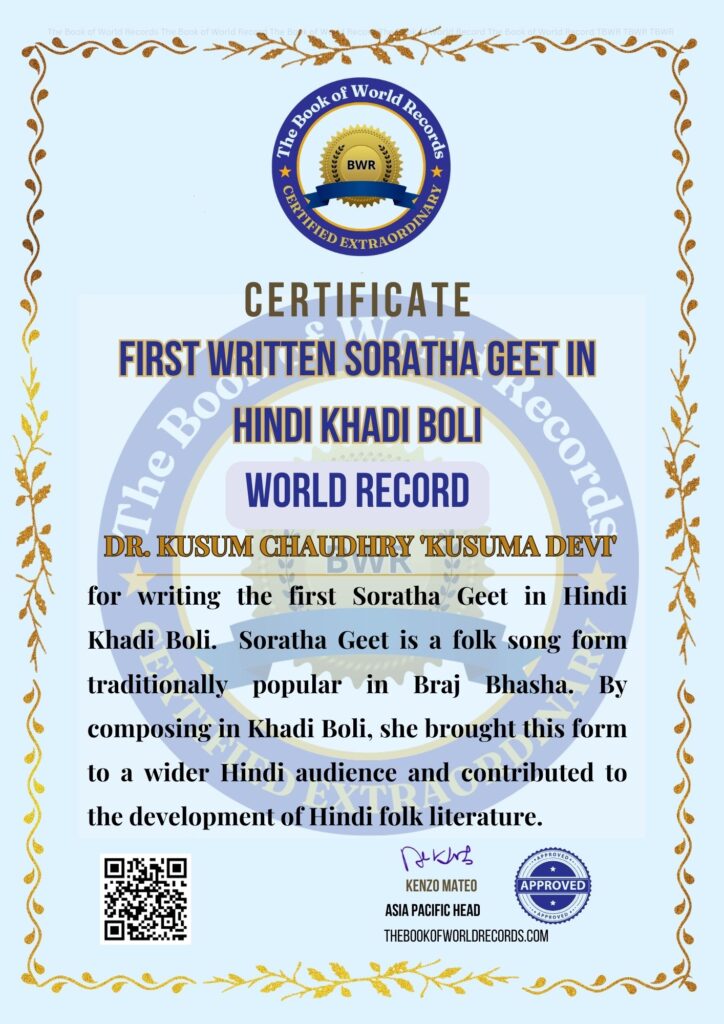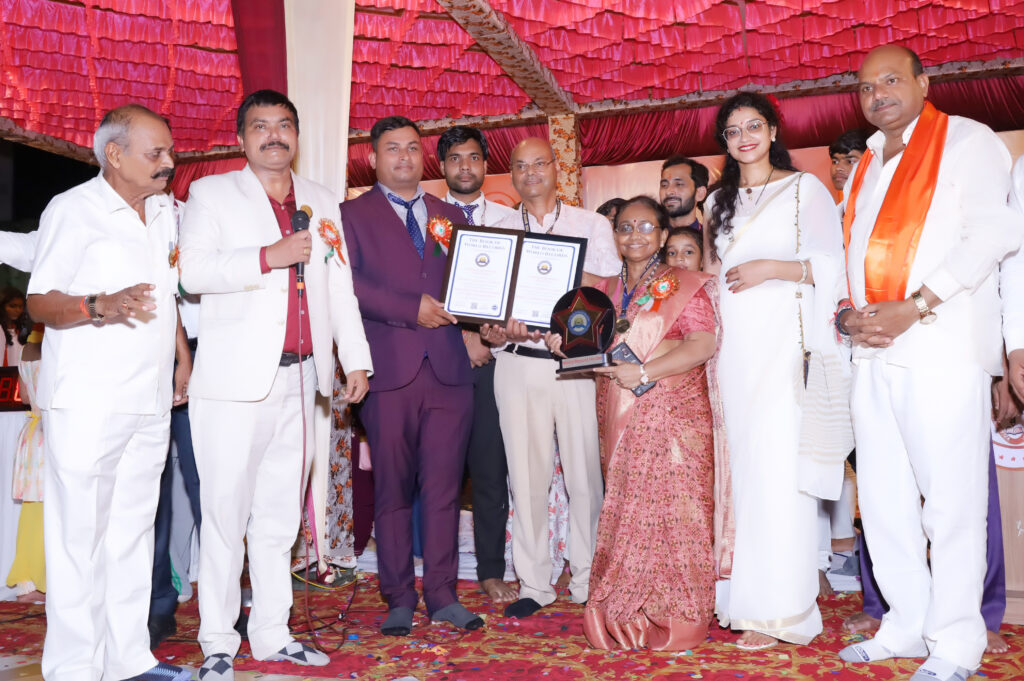The world of literature is ever-evolving, with writers and poets continuously pushing the boundaries of language and tradition. One such remarkable contribution has been made by Dr. Kusum Chaudhary ‘Kusuma Devi’, who has achieved a world record for writing the first-ever Soratha Geet in Hindi Khadi Boli. This achievement has been recognized by The Book of World Records, highlighting her groundbreaking effort in preserving and innovating Indian folk literature.
Soratha Geet, a deeply rooted folk song form, has traditionally been composed in Braj Bhasha. However, by crafting it in Hindi Khadi Boli, Dr. Kusum Chaudhary has expanded its reach, making it more accessible to a broader audience while preserving the essence of Indian folk traditions. Her contribution marks a significant milestone in Hindi literature, blending tradition with modern linguistic practices.
Understanding Soratha Geet and Its Significance
Before delving into Dr. Kusum Chaudhary’s incredible achievement, it is essential to understand what Soratha Geet is and why it holds significance in the Indian literary and folk music landscape.
What is Soratha Geet?
Soratha Geet is a classical form of folk poetry that has been traditionally composed in Braj Bhasha, a dialect of Hindi widely spoken in regions such as Mathura, Vrindavan, and Agra. It is characterized by its melodious rhythm, lyrical beauty, and deep-rooted emotional expressions, often revolving around themes of love, devotion, and nature.
This folk form is widely popular in northern India, particularly in Uttar Pradesh, Rajasthan, and Madhya Pradesh, where it is often performed during religious and cultural gatherings. The traditional appeal of Soratha Geet lies in its ability to convey emotions powerfully while maintaining a lyrical simplicity.
Why is Writing Soratha Geet in Hindi Khadi Boli Revolutionary?
Khadi Boli Hindi is the standardized form of Hindi used in formal writing, education, and official communications across India. It differs from Braj Bhasha in terms of grammatical structure, vocabulary, and phonetics. While Braj Bhasha has poetic and classical significance, Khadi Boli is more widely understood across different regions of India.
By composing Soratha Geet in Hindi Khadi Boli, Dr. Kusum Chaudhary has revolutionized this folk tradition by making it more comprehensible and accessible to the modern Hindi-speaking audience. This innovation helps in preserving the cultural essence of Soratha Geet while ensuring that it remains relevant in contemporary literature.
Dr. Kusum Chaudhary ‘Kusuma Devi’ and Her Pioneering Achievement
Dr. Kusum Chaudhary, popularly known as ‘Kusuma Devi’, is a distinguished poet, writer, and scholar with a deep passion for Hindi literature. She has dedicated her life to reviving and innovating folk traditions, ensuring that they continue to thrive in modern times.
Her work in the field of folk literature, Hindi poetry, and linguistic innovation has earned her several accolades. However, her most notable achievement is writing the first-ever Soratha Geet in Hindi Khadi Boli, a milestone that has earned her a world record certification by The Book of World Records.
The First Soratha Geet in Hindi Khadi Boli
Dr. Kusum Chaudhary’s record-breaking Soratha Geet is a testament to her literary prowess. It retains the traditional rhythmic flow and melody of Soratha Geet while incorporating the accessibility and linguistic clarity of Khadi Boli Hindi.
उड़े पतंग नभ में, है खिचड़ी का त्योहार।
बंध करके डोर से, वह जाती है उस पार।।
भाग्य से आया है।
मकर संक्रांति का पर्व।।
मन में उल्लास भरा,
होता है मुझको गर्व।।
उत्तरायण रवि भी, हो शशक्ति का संचार।
बंध करके डोर से, वह जाती है उस पार।।
नित हो उमंग नई,
जीवन में हो हर रंग।
ऊर्जा खूब बढाओ,
हों खुशियाँ हरपल संग।।
प्रयागराज के तट, होती है भीड़ अपार।
बंध करके डोर से, वह जाती है उस पार।।
डोरी न उलझाओ।
नहि करो कभी तुम आह।।
कटती यदि पतंगें।
नहि तनिक करो परवाह।
खेल-खेल में हमें, अब खुशियाँ मिलें अपार।
बंध करके डोर से, वह जाती है उस पार।।
स्वस्थ रक्खो तन मन,
लो ईश्वर का आशीष।।
तिल्ली व गुण दान करो।
“कुसुम” प्रभु नवावो शीश।।
प्रेम करो सभी से, जीत कभी न कभी हार।
बंध करके डोर से, वह जाती है उस पार।।
This remarkable feat is significant for several reasons:
- Bridging the Gap Between Traditional and Modern Hindi
By composing Soratha Geet in Khadi Boli, Dr. Kusuma Devi has connected ancient folk traditions with modern linguistic trends, ensuring that this literary form does not fade into obscurity. - Expanding Audience Reach
While Braj Bhasha remains a beautiful and poetic dialect, it is not widely spoken in contemporary India. Writing in Khadi Boli allows more readers, scholars, and poets to engage with Soratha Geet, thus preserving and popularizing this literary tradition. - Preserving Folk Heritage
Folk traditions are the heart and soul of India’s cultural heritage. Dr. Kusum Chaudhary’s work ensures that Soratha Geet continues to be celebrated, even in an era dominated by modern literary forms. - Inspiring Future Writers
Her achievement serves as an inspiration for young poets and writers to explore and innovate within the realm of folk literature. It opens doors for more linguistic experiments and literary creativity.
Recognition by The Book of World Records

The prestigious The Book of World Records has acknowledged and certified Dr. Kusum Chaudhary’s groundbreaking contribution to Hindi literature. This recognition not only honors her personal achievement but also underscores the importance of linguistic and folk traditions in shaping Indian culture.
Why This World Record Matters?
World records are not just about setting new benchmarks; they also help in preserving and promoting cultural innovations. Dr. Kusuma Devi’s record:
- Encourages more scholars and writers to experiment with language and folk forms.
- Brings global attention to Hindi folk literature.
- Highlights the dynamic evolution of Indian poetry and song traditions.


